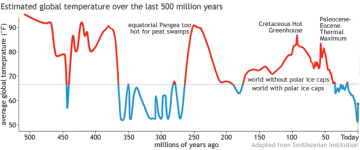Watched NOVA on the history of climate.
Cold periods are the exceptions. Having ice at both poles at the sane time generally defines a cold period.
There is no such thing as "normal" when it comes to global climate; there have been very long periods of warming or cooling, impacted by various biotic and astronomical events. Our evolution as a species occurred during a significant cooling stage, and most of the ecosystems that surround us are heavily adapted to those conditions.
View attachment 39121
Exactly. “Normal” or “typical” conditions are irrelevant; What matters is conditions that can support human life and civilisation.
Saying “the Earth has usually been warmer than it is today, so warming isn’t a problem” is as relevant as saying “most of the Solar System is a vacuum, so losing our atmosphere wouldn’t be a problem” - it’s true, as long as you are unconcerned about life.
Ultimately there are no problems, because the universe is almost entirely uninhabitable for humans, and if we all die, the universe will be essentially unchanged.
However, as a living human being, I take a more parochial perspective, in which I care more about the survival and thriving of my species, than I do about the climate our planet experienced before we even evolved.


